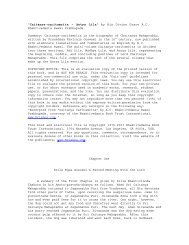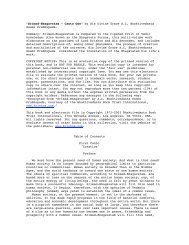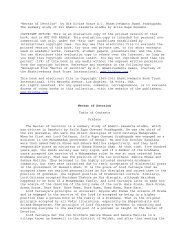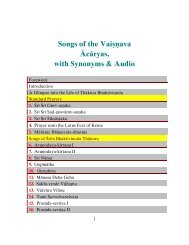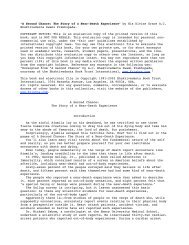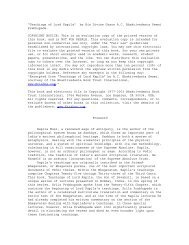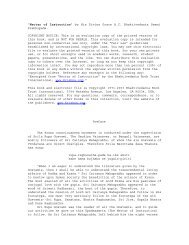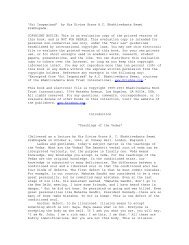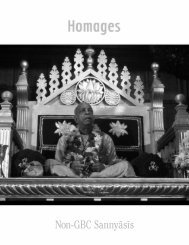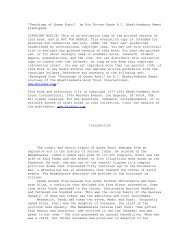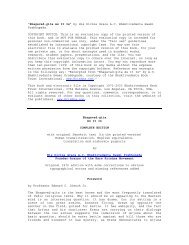“Mukunda-Mala-Stotra,” translation and commentary ... - Krishna.com
“Mukunda-Mala-Stotra,” translation and commentary ... - Krishna.com
“Mukunda-Mala-Stotra,” translation and commentary ... - Krishna.com
Create successful ePaper yourself
Turn your PDF publications into a flip-book with our unique Google optimized e-Paper software.
SYNONYMS<br />
na--not; aham--I; v<strong>and</strong>e--pray; tava--Your; caranayoh--of the lotus feet;<br />
dv<strong>and</strong>vam--to the pair; adv<strong>and</strong>va--of release from duality; hetoh--for the reason;<br />
kumbhipakam--the planet of boiling oil; gurum--most severe; api--either; hare--O<br />
Hari; narakam--hell; na--not; apanetum--to avoid; ramya--very beautiful; rama-of<br />
the fair sex; mrdu--soft; tanu-lata--of creeperlike bodies; n<strong>and</strong>ane--in the<br />
pleasure gardens of heaven; na api--nor; rantum--to enjoy; bhave bhave--in<br />
various rebirths; hrdaya--of my heart; bhavane--within the house; bhavayeyam-may<br />
I concentrate; bhavantam--on You.<br />
TRANSLATION<br />
O Lord Hari, it is not to be saved from the dualities of material existence<br />
or the grim tribulations of the Kumbhipaka hell that I pray to Your lotus feet.<br />
Nor is my purpose to enjoy the soft-skinned beautiful women who reside in the<br />
gardens of heaven. I pray to Your lotus feet only so that I may remember You<br />
alone in the core of my heart, birth after birth.<br />
PURPORT<br />
There are two classes of men: the atheists <strong>and</strong> the theists. The atheists have<br />
no faith in the Supreme Personality of Godhead, while the theists have various<br />
degrees of faith in Him.<br />
The atheists are faithless on account of their many misdeeds in their present<br />
<strong>and</strong> past lives. They fall into four categories: (1) the gross materialists, (2)<br />
the immoral sinners, (3) the number-one fools, <strong>and</strong> (4) those who are bewildered<br />
by maya despite their mundane erudition. No one among these four classes of<br />
atheist ever believes in the Supreme Personality of Godhead, what to speak of<br />
offering prayers unto His lotus feet.<br />
The theists, on the other h<strong>and</strong>, have faith in the Lord <strong>and</strong> pray to Him with<br />
various motives. One attains such a theistic life not by chance but as a result<br />
of performing many pious acts in both the present life <strong>and</strong> the past life. Such<br />
pious men also belong to four categories: (1) the needy, (2) those who have<br />
fallen into difficulty, (3) those who are inquisitive about the transcendental<br />
science, <strong>and</strong> (4) the genuine philosophers. The philosophers <strong>and</strong> those who are<br />
inquisitive are better than those in categories (1) <strong>and</strong> (2). But a pure devotee<br />
is far above these four classes of pious men, for he is in the transcendental<br />
position.<br />
The needy pious man prays to God for a better st<strong>and</strong>ard of life, <strong>and</strong> the pious<br />
man who has fallen into material difficulty prays in order to get rid of his<br />
trouble. But the inquisitive man <strong>and</strong> the philosopher do not pray to God for<br />
amelioration of mundane problems. They pray for the ability to know Him as He<br />
is, <strong>and</strong> they try to reach Him through science <strong>and</strong> logic. Such pious men are<br />
generally known as theosophists.<br />
Needy pious men pray to God to improve their economic condition because all<br />
they know is sense gratification, while those in difficulty ask Him to free them<br />
from a hellish life of tribulations. Such ignorant people do not know the value<br />
of human life. This life is meant to prepare one to return to the absolute<br />
world, the kingdom of God.<br />
A pure devotee is neither a needy man, a man fallen into difficulty, nor an<br />
empiric philosopher who tries to approach the Divinity on the strength his own<br />
imperfect knowledge. A pure devotee receives knowledge of the Divinity from the<br />
right source--the disciplic succession of realized souls who have followed<br />
strictly the disciplinary method of devotional service under the guidance of<br />
bona fide spiritual masters. It is not possible to know the transcendental<br />
nature of the Divinity by dint of one's imperfect sense perception, but the



